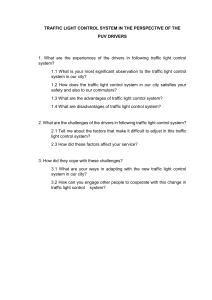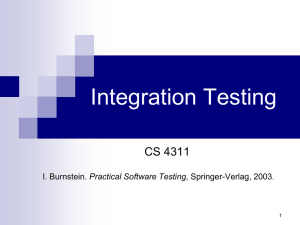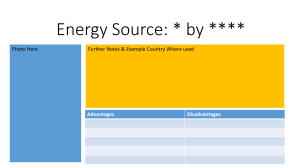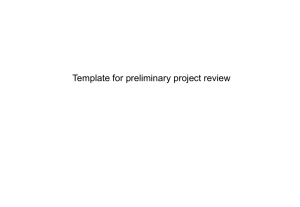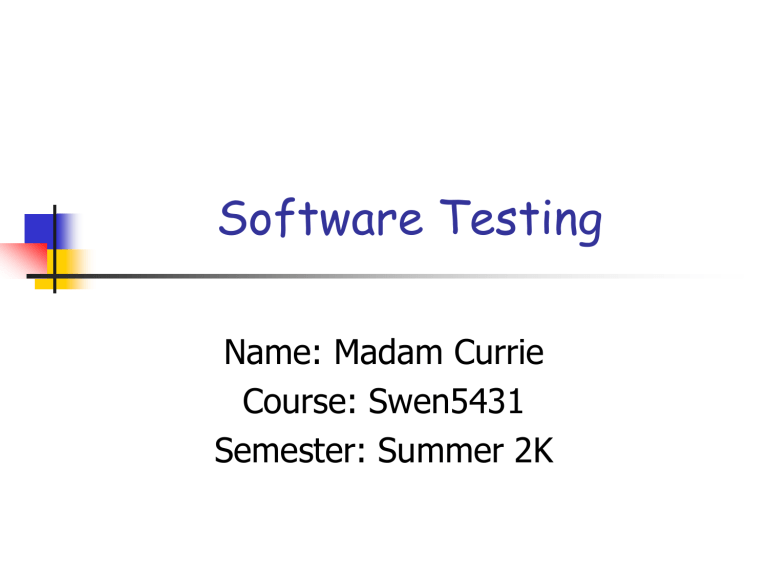
Software Testing Name: Madam Currie Course: Swen5431 Semester: Summer 2K Objective The objective of this presentation is to show the How to define Software Testing Principles What are the types of Software Tests What is Test Planning Test Execution and Reporting Real-Time Testing How to define Software Testing Principles Testing The execution of a program to find its faults Verification The process of proving the programs correctness. Validation The process of finding errors by executing the program in a real environment Debugging Diagnosing the error and correct it Software Testing Principles To remove as many defects as possible before test since the quality improvement potential of testing is limited What are the Types of Software Tests Unit Testing (White Box) Integration Testing Function Testing (Black Box) Regression Testing System Test Acceptance and Installation Tests Unit Testing (White Box) Individual components are tested. It is a path test. To focus on a relatively small segment of code and aim to exercise a high percentage of the internal path Disadvantage: the tester may be biased by previous experience. And the test value may not cover all possible values. Integration Testing Top-down Integration Test Bottom-up Integration Test Top-down Integration Test The control program is tested first. Modules are integrated one at a time. Emphasize on interface testing Advantages: No test drivers needed Interface errors are discovered early Modular features aid debugging Disadvantages: Test stubs are needed Errors in critical modules at low levels are found late. Top-down Testing T1 A A T2 B T3 B T1 T2 T3 C T4 Bottom-up Integration Test Allow early testing aimed at proving feasibility Emphasize on module functionality and performance Advantages: No test stubs are needed Errors in critical modules are found early Disadvantages: Test drivers are needed Interface errors are discovered late Bottom-up testing Test Drivers Level N Test Drivers Test Drivers Level N Level N Test Drivers Test Drivers Level N-1 Level N-1 Function Testing (Black Box) 1. 2. Designed to exercise the to its external specifications Testers not biased by knowledge of the program’s design. Disadvantages: The need for explicitly stated requirements Only cover a small portion of the possible test conditions. Regression Testing 1. Test the effects of the newly introduced changes on all the previously integrated code. The common strategy is to accumulate a comprehensive regression bucket but also to define a subset. The full bucket is run only occasionally, but the subset is run against every spin. Disadvantages: To decide how much of a subset to use and which tests to select. What is Test Planning 1. 2. 3. 4. Define the functions, roles and methods for all test phases. Test planning usually start during the requirements phase. Major test plan elements are: Objectives for each test phase Schedules and responsibilities for each test activity Availability of tools, facilities and test libraries. Set the criteria for test completion Test Execution & Reporting Testing should be treated like an experiment. Testing require that all anomalous behavior be noted and investigated. Big companies keep a special library with all copies of test reports, incident forms, and test plans Real-Time Testing 1. 2. 3. 4. Real-Time testing is necessary because the deployment system is usually more complicate than development system Rules apply for testing real time system Evaluate possible deadlocks, thrashing to special timing conditions Use tests to simulate hardware faults. Use hardware simulation to stress the software design. Design ways to simulate modules missing in the development system. References DeMillo, Software Testing and Evaluation Benjamin/Cummings Publishing Company, Inc California, 1987. Sommerville, Software Engineering Addison-Wesley Publishing Company, 1996 Humphrey, Managing the Software Process, Addison-Wesley Publishing Company, 1990.
